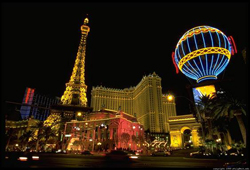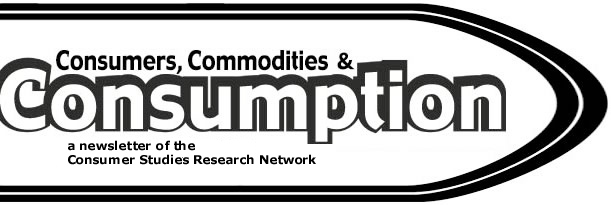 |
|
newsletter designer
Emerson University
Dan
Cook
editor
Rutgers University- Camden
George Ritzer
long-time, dedicated supporter
University of Maryland-College Park
Mike
Ryan
listserv manager
University of Maryland—College Park
Statement
of Purpose
The organizing
group for the Consumer Studies Research Network seeks to foster dialogue
and debate among those who are interested in and concerned about the
place of goods and commodities in social life. These interests and concerns
may range from the poetics of micro/personal identity formation to the
identity politics of gendered, raced and classed display, from historical
work on the rise of consumer culture to a critique of Nike advertising,
from investigations of typical places of consumption to the study the
dynamics of globalization and urban areas. Individuals affiliated with
the Consumer Studies Research Network desire to bring to the fore, in
their own ways, the depths to which commodities and a market logic have
come to pervade virtually all forms of social life and social interaction.
The primary goal is to begin to engage in an interchange.
Contact:
Dan Cook
Consumer Studies
Research Network
Rutgers University
405-7 Cooper Street
Camden, NJ 08102
phone: 856-225-2816
fax: 856-225-6435
dtcook@camden.rutgers.edu
Have something to say? Send in essays, comments, letters, reviews, observations
for the next Newsletter.
George Ritzer
University of Maryland
ritzer@socy.umd.edu
This essay is from a talk given as part of the “Crisis and Constradictions of Consumption” conference in Las Vegas in August 2011.
There is, at least from my point of view, no better place to discuss the crisis and contradictions in consumption in the US, especially in its cathedrals of consumption, than in Las Vegas, the city devoted to, and built on, consumption and defined globally by its iconic cathedrals of consumption; the major casino-hotels on the Strip. It is here that we witnessed what was arguably the greatest consumer-driven expansion in the US in the run up to the Great Recession and, as a result of the latter, perhaps the greatest economic setbacks.
Unemployment in Las Vegas rose as high as 15% and is still over 12%. New construction is virtually non-existent. The foreclosure rate, while slightly down from 2009, remains the highest, and by a wide margin, of all the metropolitan areas in the US.  Gaming revenue dropped by $2 billion at the depth of the recession and is still down about $1.5 billion from the peak. The largest casino hotel conglomerates- MGM and Caesars- continue to report huge losses largely because of debt incurred during the Great Recession. Mirroring the global economic shift to the Far East, Las Vegas is no longer the gambling capital of the world and has been surpassed by both Macau and Singapore.
Gaming revenue dropped by $2 billion at the depth of the recession and is still down about $1.5 billion from the peak. The largest casino hotel conglomerates- MGM and Caesars- continue to report huge losses largely because of debt incurred during the Great Recession. Mirroring the global economic shift to the Far East, Las Vegas is no longer the gambling capital of the world and has been surpassed by both Macau and Singapore.
 |
|
|||||
Crisis in Consumption OR American Capitalism: A Sociological Perspective on the Consumer-Led Recession
Robert D. Manning
Responsible Debt Relief Institute
R.Manning@ResponsibleDebtRelief.org
With the onset of the fifth year of the Great Recession, it is surprising how muted has been the voice and public policy influence of Sociology in general and sociologists in particular. For students of the Sociology of Consumption, there is an enormous opportunity to explore new theoretical and empirical approaches to the greatest economic crisis of the post-World War Two period. Like the examination of the social problems precipitated by Hurricane Katrina, sociologists could play an enormous role in shaping new generational expectations (challenge ethos of economic mobility), politically progressive mobilizations (Occupy Wall Street), environmentally sustainable policies (Green Energy), future patterns of reduced inequality (income tax reform), cultural mores (socially responsible consumption, greater savings), and prudent public policy (consumer protections, marketing regulations). This monumental project includes a wide-range of challenges at a multitude of levels including academic, intellectual, national, community, cultural, behavioral, and legal/statutory discourses. The current failure of the dominant economic paradigm offers an historic opportunity for Sociology to “Seize the Moment” before other perspectives and approaches gain greater “brand” recognition and are “consumed” with greater gusto and accompanying PR spin.
Competing Narratives of Current Societal Crisis
The most striking feature of the current economic crisis and attendant public policy discourse is the lack of “Sociological Imagination.”